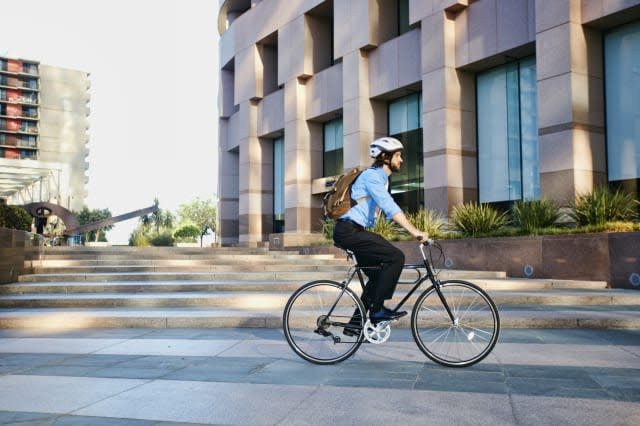Taxpayer 'should foot cycling bill'

Taxpayers should foot the bill for a five-fold increase in cycling infrastructure, a powerful group of MPs has said.
Government spending on cycling should rise from £2 per person to £10 in the next six years, according to the Transport Select Committee, which said a "cultural change" is needed to ease tensions between motorists and cyclists.
The committee said cyclists complained of problems including aggressive driving, poorly-designed junctions and a failure to enforce speed limits which were contributing to quarrels between road users.
In its report examining how roads could be made safer for those on bicycles, the committee calls for all departments to work together to fund and facilitate support for cycling.
Committee chairman Louise Ellman MP (Labour, Liverpool Riverside) said: "Transport ministers must demonstrate clear political leadership by championing cycling and the Department for Transport must coordinate action across government on this vital agenda."
The report says a cycling budget of £10 per head of population by 2020 is "essential to fund long-term development of cycling infrastructure and to make our roads safer for cycling".
Last year 109 cyclists were killed on roads in England, Scotland and Wales, with more than 3,000 serious injuries.
Ms Ellman said: "Cyclists have told us the dangers they face every day from a lack of cycling infrastructure, poorly-designed junctions and aggressive driving.
"Spending on cycling is currently estimated to be just £2 per head. To make the necessary improvements to cycling infrastructure and training, we call for spending to be increased to £10 per head by 2020.
"Investing in cycling will make the roads safer for all users, and encourage more people to cycle and walk."
The report states there is "limited evidence of a widespread culture that is supportive of cyclists as road users", despite Prime Minister David Cameron last year calling for a "cycling revolution" following successes in the Olympics, the Paralympics and the Tour de France.
Ms Ellman added: "Drivers and cyclists should be encouraged to share the road safely, to treat each other with respect and to comply with the law.
"The DfT should support local authorities to make it easier and cheaper for them to introduce 20mph speed limits in high-risk areas.
"The road haulage and construction sectors must pursue best practice to improve their road safety record. It's vital they curb the high number of big vehicles - such as concrete and tipper lorries - involved in fatal collisions with cyclists."
The Committee also calls on the heavy goods vehicle industry to improve its road safety record, and that bicycle training should be made available to schoolchildren.
It also calls on the Driving and Vehicle Standards Agency it ensure that motorists are tested on their approach to sharing the road with cyclists.
Shadow transport secretary Mary Creagh said: "Labour welcomes the committee's support for safer cycling. Improving cycle safety requires a long-term plan, not the unplanned, back-of-the-envelope approach we have seen under this Government.
"Labour has committed to introducing a duty to consider cycling when designing new roads and to reducing the risks that HGVs pose to cyclists with our HGV Cycle Safety Charter and better cab design."
Jon Snow, president of national cycling charity CTC, said: "The positive recommendations made by the select committee are good news.
"But we need our Government to go one step further and make the commitment to at least £10 per head funding to make safe cycling in the UK with immediate effect, not six years from now."
A Department for Transport spokesman said it had more than doubled cycle funding to £374 million.
He said: "This money, which with match-funding will top £622 million, is helping to deliver safer junctions and roads, improved cycle links, better safety training in schools and more cycle parking.
"We recently announced an extra £130 million to support cycle networks in towns and cities across England and Wales and another £15 million for improving the integration between rail and cycle journeys."




